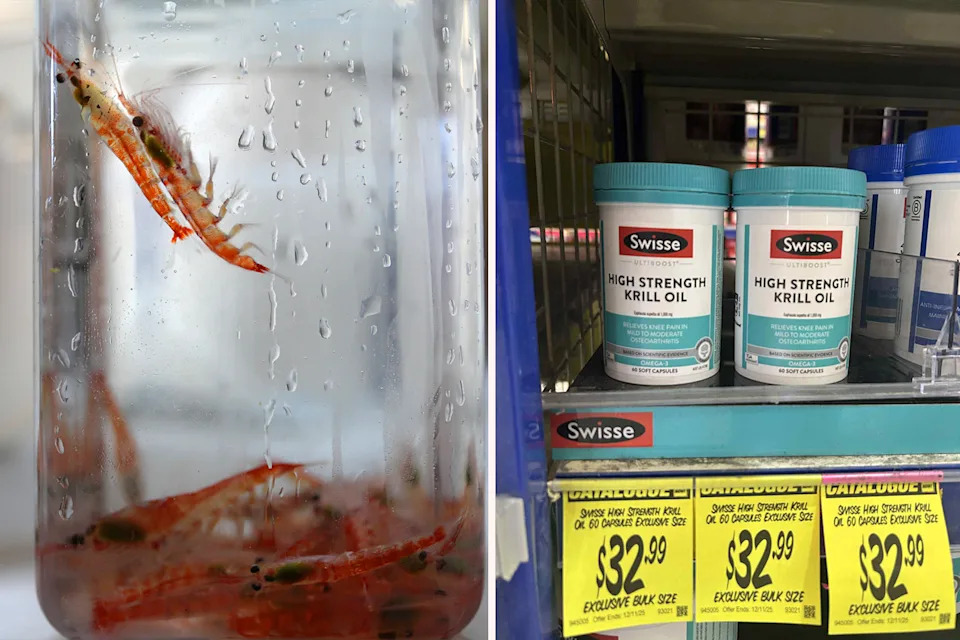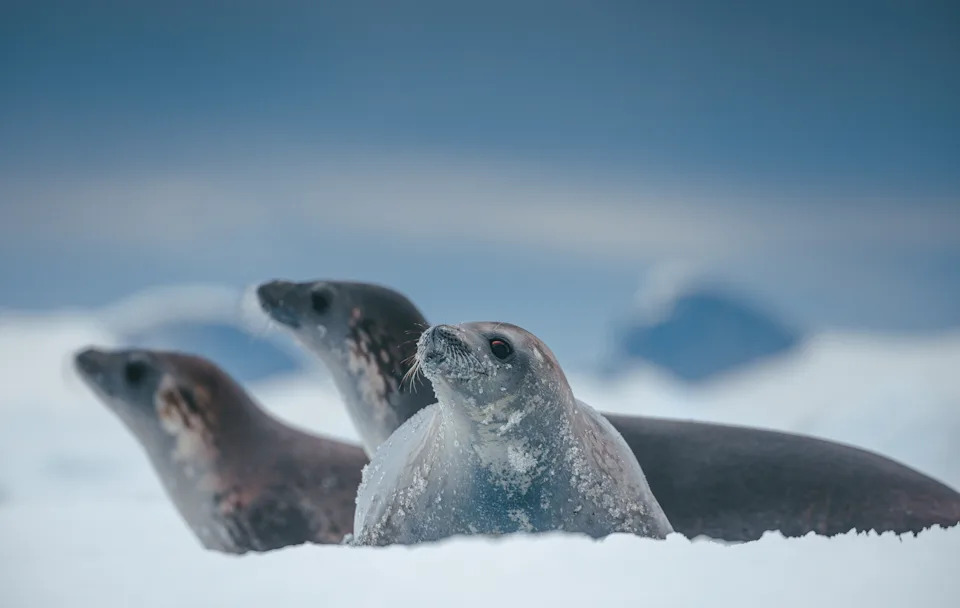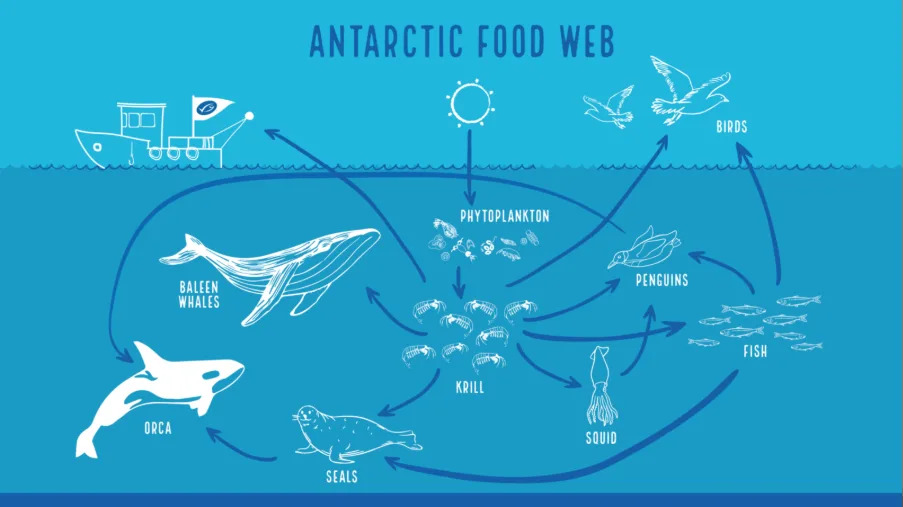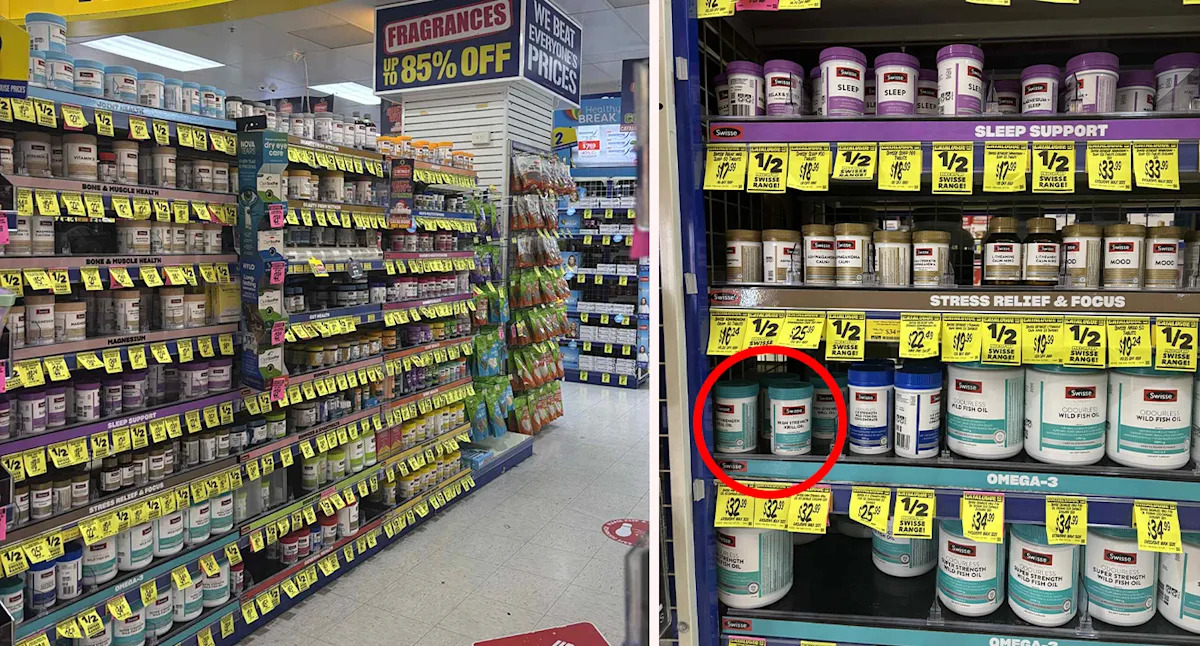Australians are being urged by conservationists to boycott a popular supplement sold by wellness company Swisse. Its active ingredient was linked to concerning practices in a fragile ecosystem.
Swisse Ultiboost High Strength Krill Oil retails for around $33 at major pharmacies. The supplement is sold as an alternative to fish oil because it’s rich in omega-3 fatty acids.
While the company maintains it is committed to using “sustainably-sourced ingredients” there is growing unease that some supertrawlers are now “emptying the ocean” in pockets of Antarctica that are key biodiversity hotspots, following a change in regulations.
Problems with krill harvesting in general were most recently highlighted in David Attenborough’s Oceans documentary.
It highlighted that some commercial vessels are targeting fisheries integral to the survival of seals, penguins, seabirds and whales.
Australia’s Bob Brown Foundation has paid for billboards be be plastered across Melbourne and Sydney as part of its new Swissekrills campaign, which targets the industry.
The charity’s marine campaigner, Alistair Allan, said the launch occurred after Swisse allegedly ignored requests to discuss its concerns, so now it’s publicly encouraging the company to stop selling krill oil, and to promote consumer awareness.
Describing krill fishing as an “environmental crime”, Allan accused Swisse of “doing nothing” to inform consumers about the impact that krill harvesting is having on the environment.
He noted global retailer Holland & Barrett, has agreed to stop selling krill oil products in stores across Europe.
“The krill that is used to make Swisse’s product is literally taken from the mouths of penguins and whales in Antarctica who rely on it to survive,” Allan said.
Swisse responds to krill oil campaign
Swisse’s krill is sourced from Europe’s Aker BioMarine, the world’s largest harvester. In a statement, the company’s chief supply chain officer, Christian Sim, confirmed it was aware of Bob Brown Foundation “directly targeting” Swisse and that he believes its ultimate goal is to end all krill fishing.

Swisse claims its krill oil can provide mild improvement in symptoms of mild to moderate osteoarthritis and has been linked to supporting cardiovascular health. Source: Getty/Yahoo
Responding to the campaign, Sim said Swisse was “committed to sourcing high-quality, sustainably-sourced ingredients for products that support the health needs of our consumers”. He noted its Chinese-owned parent company, Health and Happiness Group, is B-Corp certified, a scheme that allows companies to use its trademark if they meet its standards for social and environmental impact.
The krill oil used by the company is Marine Stewardship Council (MSC) certified, which Sim said “adheres to fishing practices that ensure the long-term sustainability of the Antarctic Krill Fishery”.
However, MSC’s ongoing certification of the krill fishery is not assured. And there are wider concerns about the ongoing sustainability of the industry in Antarctica.
WWF calls for moratorium on Antarctic krill fishing
Krill fishing in Antarctica is capped at 1 per cent of the fishery’s total biomass, and this year that limit was reached in August, forcing it to close early for the first time in history.
The fulfilment of the quota has been linked to the 2024 lapsing of a key protection measure set 16 years ago by the Commission for the Conservation of Antarctic Marine Living Resources (CCAMLR). It had compelled trawlers to harvest their catch from a spatially distributed area to ensure key pockets of ocean weren’t destocked, rather than saving time and money by concentrating their efforts on a small area.

WWF-Australia is concerned that krill is being denuded from areas where biodiversity is abundant. Source: Getty
World Wide Fund for Nature-Australia’s ocean conservation manager Emily Grilly told Yahoo News the problem with overfishing these “hotspots” is that they’re also the areas with the highest biodiversity.
“The whales, penguins, seals, and seabirds that rely on krill to eat and survive they’re also in those areas, and they’re competing with fishing vessels. And that’s the problem,” she said.
It had been hoped the issue of overfishing these areas would be resolved at the CCAMLR annual meeting in Hobart a week ago. When it wasn’t, WWF-Australia called for a moratorium on Antarctic krill harvesting.
“Companies that use krill have a responsibility to know how their products are being sourced, harvested, or extracted, and when there are significant changes to management — like what we saw in 2024 with significant removals of protection — it’s their responsibility to modify how they are sourcing their products,” she said.

This diagram highlights how krill supports the Antarctic food web. Source: MSC
Could the fishery lose its MSC certification?
MSC has recognised that the management of krill fisheries needs to keep evolving, and it is encouraging improvements to spatial management to ensure krill are available to wildlife in areas where they need it most.
Its program director for Oceania, Anne Gabriel, told Yahoo News its blue tick gives consumers “confidence” that the seafood they’re purchasing comes from a fishery independently audited to meet its environmental standards. Once a fishery is certified, it is subject to annual checks.
“MSC takes the management of krill very seriously, with additional requirements for fisheries targeting the stock; auditors have given krill fisheries certified to the MSC standard five years to address the ecological risk of localised depletion,” she said.
“Failure to meet this condition by 2026 could result in suspension from the MSC program.”
Love Australia’s weird and wonderful environment? 🐊🦘😳 Get our new newsletter showcasing the week’s best stories.


